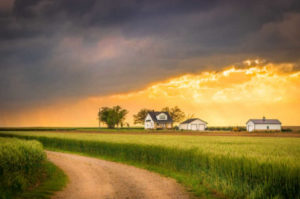You know that Americans are escaping the city. You’ve read here about their efforts to find a better life in America, away from the taxes, crime, and pollution of America’s big blue cities. Americans have been happy to find new homes in long-neglected country towns where they can work from home and raise their children in safe, healthy communities. At The Wall Street Journal, Sarah Chaney Cambon and Andrew Mollica report on America’s rural renaissance, writing:
Even in the face of inflation and the risk of recession, the broad economic prospects for rural America may be looking up for the first time in years.
Small communities have long lagged far behind big cities in job creation and income growth. But since the pandemic, many are seeing an infusion of remote workers drawn by lower costs, laid-back lifestyles and natural beauty—and worn down by crime and other urban challenges. Their presence has helped spur hiring, income gains and home-price growth in rural towns.
The question now is whether these transplants are there to stay.
After years of losing residents, Litchfield County in the northwest corner of Connecticut drew in workers after the Covid-19 pandemic hit. In Winsted, a small town in the county overlooking a large lake, commercial real-estate sales used to be fairly weak, said Gary Giordano, a Realtor and economic-development commissioner in the area. The pandemic helped change that, he said.
“There’s an economic turnaround, for sure,” Mr. Giordano said. “More and more people wanted to leave the city, came up here, bought houses, realized that this might not be a bad place to work.”
Those newcomers are sipping drinks at the craft brewery downtown, which opened in the year before the pandemic and serves beers on tap. They are placing orders at the new cafe on Main Street whose menu includes an extensive list of sweetened cold brews, fruity ice teas and spritzers.
Such rural gains are in their early stages and could be vulnerable to a national economic downturn. They also depend on how far the back-to-the-office movement goes. In recent months, office reopenings and waning pandemic disruptions have drawn some workers back to urban life, a trend that is manifested in the rising rental prices of places such as New York City.
David Sartirana, a real-estate broker in the Winsted area, said he was inundated with business in 2020 and 2021 as more people moved to Litchfield County. Interest from city dwellers in buying homes has recently cooled, he said.
“Up until this January, February the phone was [going] absolutely nuts,” Mr. Sartirana said. “There’s definitely been a slowing down.”
Even so, recent trends reflect the impact that remote work has had on rural and urban geography. Rural counties saw a net gain in population from mid-2020 through mid-2021, a sharp shift from the decade preceding the pandemic, when they lost residents, a Wall Street Journal analysis of U.S. Census Bureau data found. Meanwhile, big cities, which were already losing residents, saw an accelerated exodus once Covid-19 struck.
Regionally, residents left the Northeast and West Coast, which have a relatively high concentration of big cities, at a faster pace once the pandemic hit. The more-rural South was the only region to gain population.
Remote work was a greater driver of worker relocation during the pandemic than the risk of Covid-19 or government restrictions, according to an analysis of moving-company survey data by Peter Haslag, a finance professor at Vanderbilt University.
Big, dense cities are particularly susceptible to losing residents because they are expensive and employ the largest share of workers in jobs that can be done remotely in sectors such as finance, management and publishing, according to Princeton University economist Lukas Althoff and co-researchers.
And migration to less-populated areas appears to be continuing. The number of migrants from high-cost large metro areas to small cities, towns and rural areas was about 15% higher during the four quarters ending in March compared with the average for the three-year period preceding the pandemic, according to calculations from Stephan Whitaker, an economist at the Federal Reserve Bank of Cleveland.
Action Line: If you are newly arrived in a country town, and want to learn how to Survive & Thrive in America, click here to subscribe to my free monthly letter where I’ll help you prepare your family for the success you deserve.
Originally posted on Your Survival Guy.
If you’re willing to fight for Main Street America, click here to sign up for the Richardcyoung.com free weekly email.





